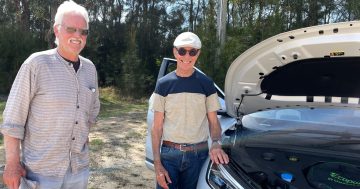
The pristine environment of the NSW South Coast is vulnerable to bushfires and power outages, as demonstrated during the Black Summer. Photo: Sue Hutcheson.
As was sadly proven by the tragic events of the Black Summer bushfires, the NSW South Coast, like many regional communities, is incredibly vulnerable to fires and power outages.
A new project will see Australian National University (ANU) researchers and local sustainability advocates combine their expertise to develop ‘islandable’ microgrids which can maintain power supply in towns and townships, even if the connection to the main grid is lost, as occurred during the bushfires.
According to Southcoast Health and Sustainability Alliance (SHASA) president Kathryn Maxwell, solutions to the region’s precarious power grid are something the local group has long wanted to find.
However, she explained the group’s best efforts are often hampered by not only the complexities of the power grid, but also by the need to have key players in the region commit to solving issues and secure funding to make changes happen.
$25.6 million in funding was made available through the second round of the Federal Government’s Regional and Remote Communities Reliability Fund, which is looking to secure reliable, and preferably renewable, electricity for regional and rural communities.
Now that SHASA has teamed up with the ANU, the Eurobodalla project, which was one of 20 in Australia selected, was allocated $3.1 million – one of the highest individual grants nationwide.

Microgrids can maintain power supply in small areas even if connection to the broader grid is damaged or lost. Image: Southcoast Health and Sustainability Alliance.
As part of the project, eight microgrid business cases and implementation plans will be developed across the Eurobodalla Shire during the course of the next three years.
According to Ms Maxwell, SHASA will liaise with other community groups to share their learnings.
It’s the latest in a string of renewable energy projects in the region. Recently, the group worked with long-term partner Micro Energy Systems Australia (MESA) to encourage households and businesses to install rooftop solar through a solar bulk-buy program.
Ms Maxwell said this has resulted in more than 20 per cent of households in the Eurobodalla Shire having installed the systems, and they are now looking to the microgrid project as the natural next step.
She envisages a need for both community batteries and solar – both rooftop and farms in the microgrids – and says community batteries can help to stabilise the grid.
Essential Energy and Zephen have also come on board in order to lend technical expertise to the project and ensure long-term and effective solutions to the power grid challenges currently facing the region.
The 16 towns of Tilba Tilba, Central Tilba, Mogo, Nelligen, Bodalla, Congo/Meringo, Potato Point, Turlinjah, Nerrigundah, Moruya Heads, South Durras, Mystery Bay, Broulee, Tomakin, Mossy Point and Tuross Head were identified as having fragile power grids, and up to eight of them will be selected for the microgrids.
Ms Maxwell explained that a thorough analysis of community engagement, technical and social aspects will take place in order to determine which towns will be selected.
If you are interested in being involved in the microgrid feasibility study, visit Southcoast Health and Sustainability Alliance, send an email to contact.shasa@gmail.com, or call 0467 558 645.













